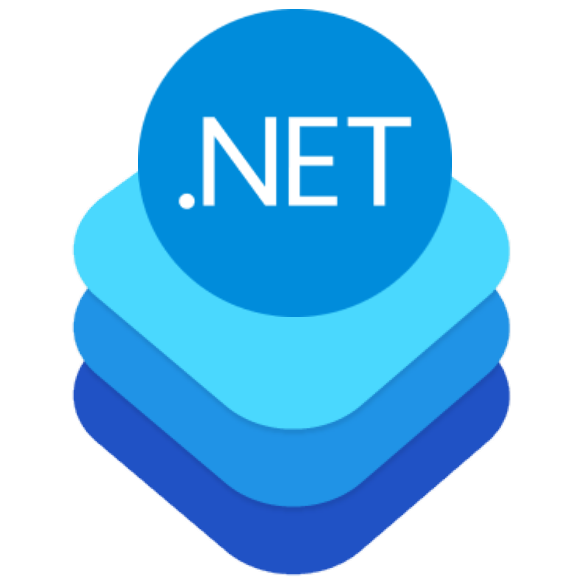26
DecWhat is ASP.NET Core? Everything You need to know
ASP.NET Core
ASP.NET Core is a lightweight, open-source, and cross-platform unified framework for developing web UI and web APIs. If you're interested in web development, you might want to learn about ASP.NET Core. Microsoft's framework is quite great, and it was intended from the bottom up to be quick, flexible, and modern. It's essentially a redesigned version of ASP.NET, but it's open-source and cross-platform, so it works on Linux, macOS, and Windows as well.
So, In this ASP.NET Core Tutorial, We are going to learn all about ASP.NET Core only, Including what is asp.net core, asp.net core features, the Evolution of ASP.NET Core, etc. First, let's see what is asp.net core. ASP.NET powers 35% of modern web applications. Don’t miss out—join our Free ASP.NET MVC Course today.
What is asp.net core?
ASP.NET is a Web Development Framework developed by Microsoft. It is built on the .NET platform and provides many great features that help developers build dynamic and data-driven web applications and services. The best part is that it gives the freedom to the developers that they can use a variety of programming languages.
ASP.NET Core thrives when it comes to developing cloud-based internet-connected applications such as web apps, IoT apps, and mobile backends. Its lightweight and modular design makes it an excellent choice for developers looking to create applications that can scale efficiently. Furthermore, it supports many development techniques such as MVC, and WebAPI. While learning ASP.NET Core you should have basic knowledge of front-end development and backend development.
Read More: |
Evolution of ASP.NET Core
The history of ASP.NET Core is an intriguing journey that demonstrates Microsoft's dedication to updating its web development technologies to match the needs of today's diverse computing environments. Here's an overview of how ASP.NET Core has evolved:
1. From the beginning with ASP.NET
The story begins with ASP.NET, which was designed in the early 2000s as part of the.NET Framework. ASP.NET was a significant step forward from the original ASP, offering a sophisticated server-side scripting engine that allowed developers to create dynamic web applications in compiled languages such as C# and VB.NET.
2. Switch to Open Source and Modular Design.
As the market moved towards more modular and open-source software, Microsoft began to evolve ASP.NET. This prompted the creation of ASP.NET Core, which was released in 2016 as a newly revamped framework that was open-source, cross-platform, and could operate on top of the.NET Core foundation. This marked a substantial departure from the Windows-only.NET Framework.
3. Cross-platform
One of the most groundbreaking additions to ASP.NET Core was its ability to run on Linux and macOS in addition to Windows. This broadened the framework's reach and enabled developers to use ASP.NET technologies in a wider range of contexts and deployment situations, such as cloud-based systems and containers.
4. Improved performance
ASP.NET Core was developed with performance in mind. It launched the new Kestrel web server, which is a lightweight, high-performance web server built exclusively for ASP.NET Core. This, together with changes to the core architecture, made ASP.NET Core far quicker and more scalable than its predecessor.
5. Support for Modern Web Development.
ASP.NET Core enables current web development approaches right out of the box. This includes first-rate support for RESTful API development, real-time technologies like WebSockets, and tighter integration with modern client-side frameworks like Angular, React, and Vue.js. It also included better support for dependency injection, a new configuration system, and the ability to combine environments from several applications.
6. Continuous Improvements and.NET 5/6/7 Integration.
Microsoft has continued to improve ASP.NET Core through frequent upgrades and new features. The inclusion of ASP.NET Core in.NET 5 and subsequent.NET 6 and 7 releases was an important milestone, as.NET Core and the classic.NET Framework began to meld into a single unified platform. This unified platform, is commonly known as .NET.
Features of ASP.NET Core
- Open-source
- Cross-platform framework which runs on macOS, Linux, and Windows.
- Runs on the top of .NET Core or full .NET Framework having version 4.6+.
- A unified framework for building web UI and web APIs.
- Built-in dependency injection.
- New lightweight and modular HTTP request pipeline.
- Ships entirely as NuGet packages.
- Side-by-side versioning when targeting .NET Core.
- Built-in support for SPA using client-side frameworks like Angular, React, Vue, etc.
- Supports IIS, Nginx, Apache, Docker, or self-host deployment.
Let's See Some important features of ASP.NET Core in detail:
1. Performance
ASP.NET Core is designed for speed. Its lightweight architecture and support for asynchronous programming allow applications to handle more concurrent connections, making it substantially faster than its predecessor, ASP.NET. This makes it perfect for use in high-performance environments.
.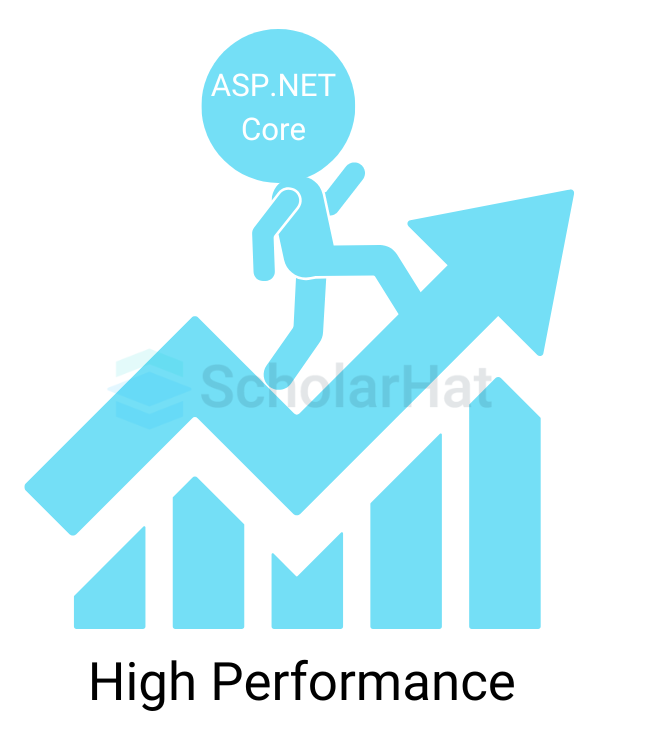
2. Modern & Innovative
This framework is at the vanguard of web technology, incorporating the most recent web standards, protocols, and development approaches. The design works perfectly with modern front-end frameworks and includes built-in support for dependency injection, which keeps your application clean, controllable, and extendable.
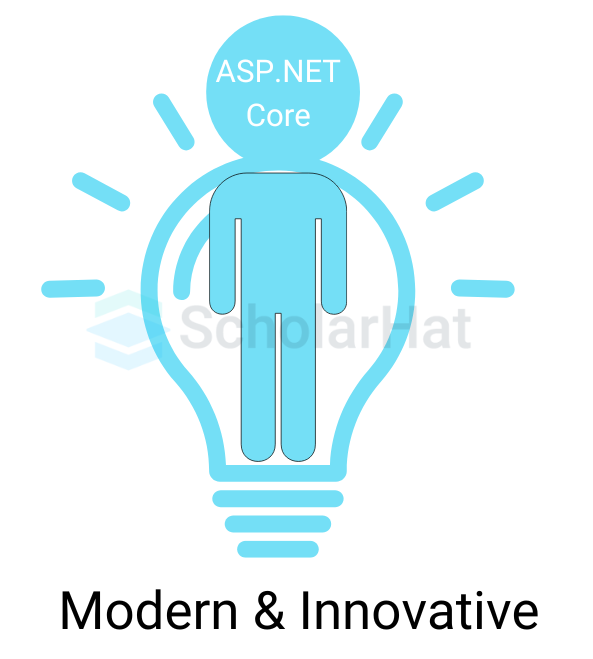
3. Open-source
One of the most significant advantages of ASP.NET Core is that it is entirely open-source. This allows developers from all over the world to participate to the framework's development, ensuring that it remains current and functional. Developers can also review the codebase to have a better understanding of how things function behind the scenes and contribute their own enhancements and ideas.
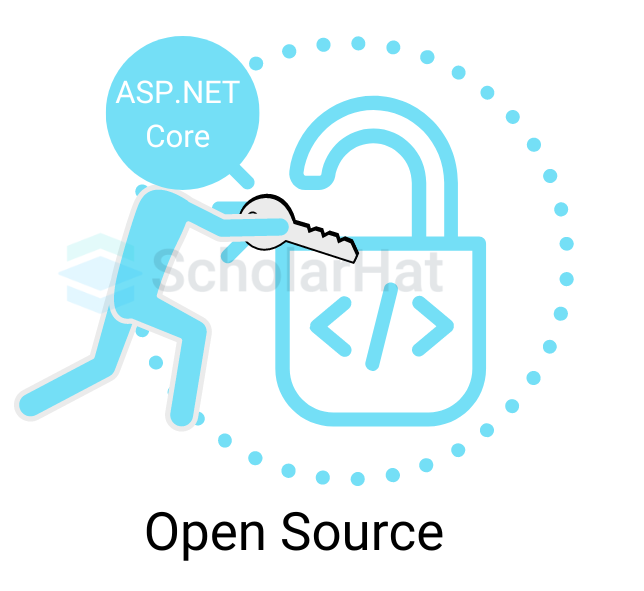
4. Cross-Platform Support(Windows, Linux, macOS, and Docker)
ASP.NET Core is available for Windows, Linux, and macOS, providing a wide range of deployment and hosting options. This cross-platform compatibility includes Docker, which simplifies deployment even further through containerization. Docker allows you to package your program and its dependencies into a container that can operate on any Docker-compatible machine, making deployment easier and more reliable.
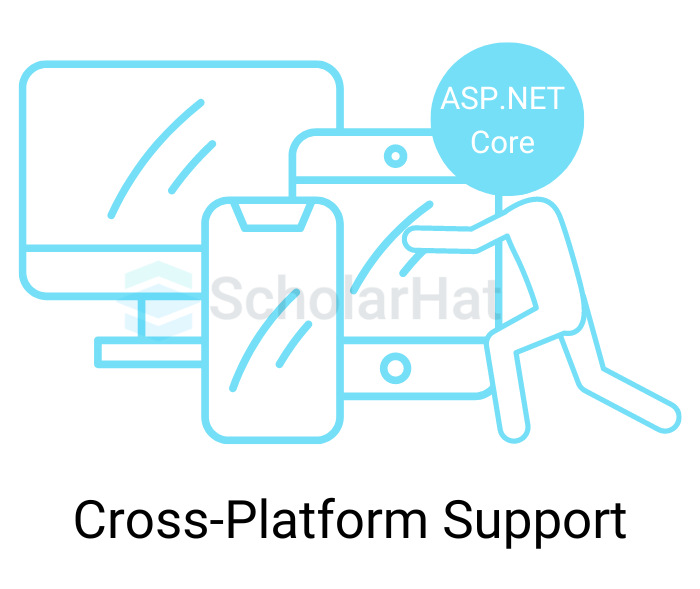
5. Flexible Deployment
The framework offers a variety of deployment models. You can either deploy your program as a self-contained unit with its own version of the.NET runtime, or you can configure it to use a shared system-wide version of the runtime. This flexibility enables you to make options that are best suited to your application's scalability, maintenance, and performance requirements.
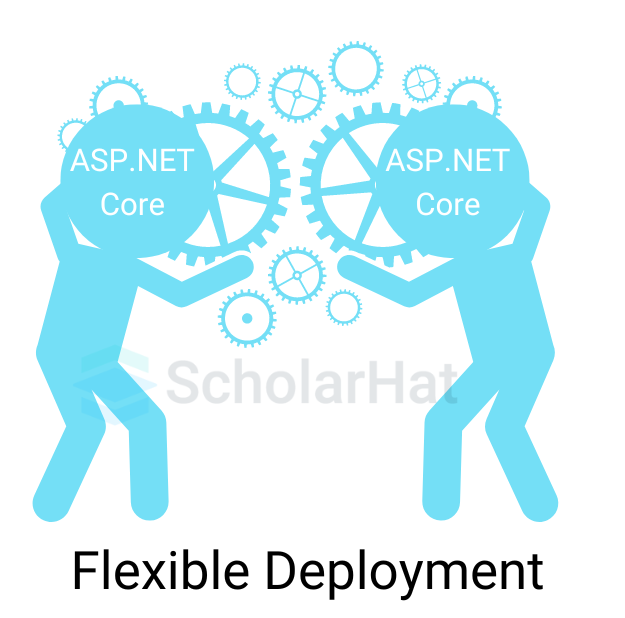
6. Supported
Despite being open-source, ASP.NET Core receives extensive support from Microsoft, which not only develops and maintains the framework but also ensures that it works seamlessly with other Microsoft products and services. Furthermore, the framework is used by a huge community of developers and companies, resulting in an extensive ecosystem of tutorials, tools, libraries, and third-party services.
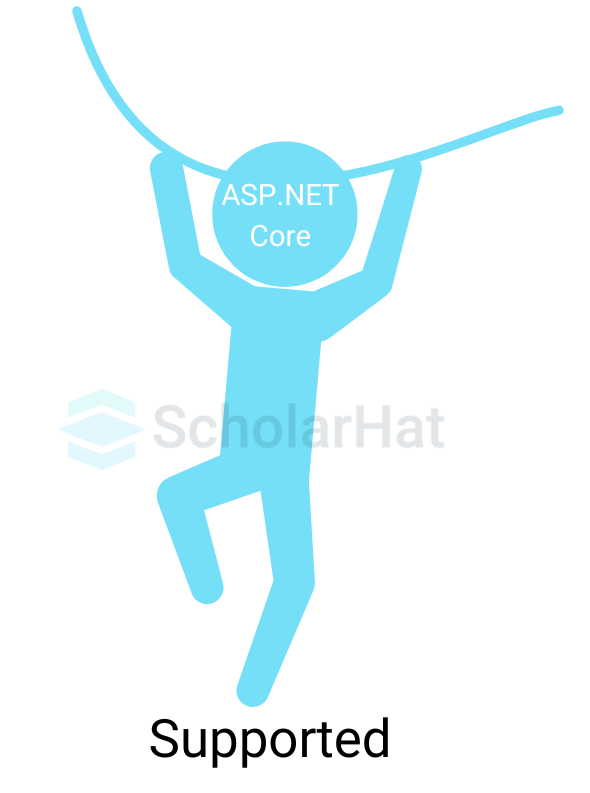
Overall, ASP.NET Core provides a modern, high-performance, and adaptable environment for developing web apps, making it an appealing alternative for developers wishing to utilize the best of web development capabilities.
ASP.NET Core Architecture
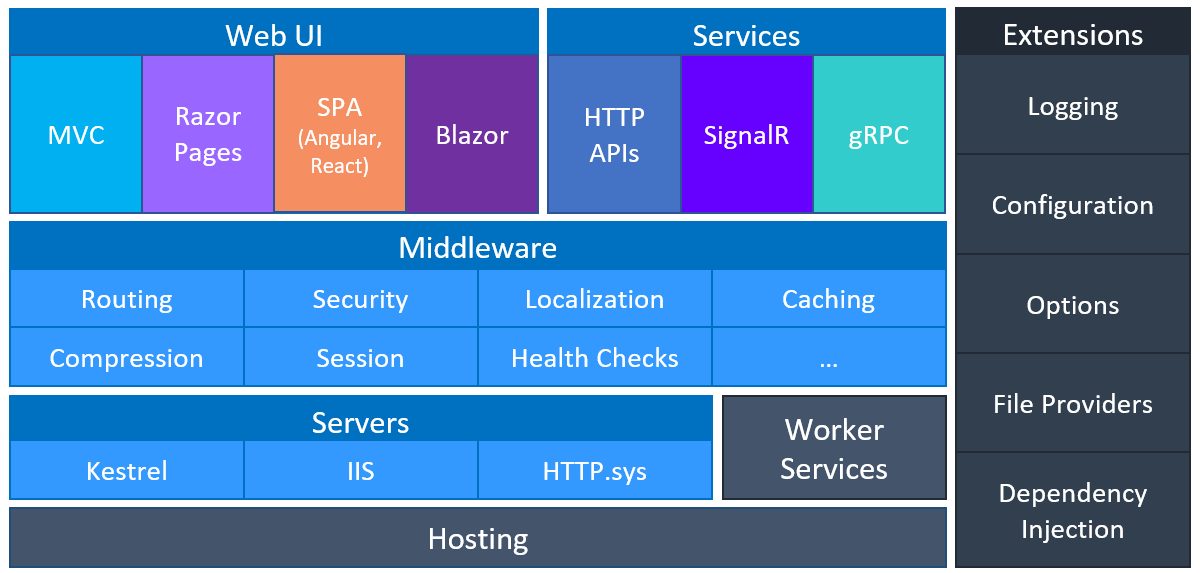
Read More: What is an ASP.NET Core Developer? Skills to become ASP.NET Core Developer
ASP.NET Core Version History
ASP.NET Core Performance Benchmarks
ASP.NET Core is the fastest framework, serving 2300% more requests per second than ASP.NET 4.6. It's around 20 times faster than Node.js.
ASP.NET Core Anatomy
In ASP.NET Core everything starts with Program.cs, Main Method. ASP.NET Core apps require a startup class which serves as an alternative to Global.asax in ASP.NET 4.x. It uses a cross-platform Kestrel web server to serve the request and response. Here, IIS/Apache Tomcat/Nginx works as a delegation web server, and is used to delegate the incoming request to the internal Kestrel web server.
Differences Between ASP.NET Framework and .NET Core
.NET Core is a general-purpose development platform, while ASP.NET Core is a framework for building web applications on top of .NET Core.
| Parameters of Comparison | .NET Core | ASP.NET Core |
| Parent Platform | .NET framework is the parent platform of the current multi-platform framework, .NET Core. | ASP.NET is the parent framework of the ASP.NET Core. |
| Full Name | The full name of the .NET Core is Network Enabled Technologies Core. | The abbreviation ASP.NET Core stands for Active Server Pages Network Enabled Technologies Core. |
| Released year | This open-source, cross-source platform was initially released in 2012, a decade after the release of ASP.NET Core. | The released year of ASP.NET Core is 2002. |
| Latest Versions | The latest version of .NET Core is .NET Core 3.1. | The latest version of ASP.NET Core is .NET Core 8.0. |
| Compatible Operating System | The Operating Systems compatible with .NET Core are Windows, Linux, and Mac. | The Operating Systems compatible with ASP.NET Core are Windows, Linux, and Mac. |
| Tooling and Ecosystem | .NET Core has a specialized ecosystem for web development. It provides additional libraries for HTTP requests, client-side scripting, integration with front-end frameworks, and database operations. | ASP.NET Core also seamlessly integrates with popular development tools like Visual Studio and Visual Studio Code, enhancing the development and debugging experience for web applications. |
Read More: Difference Between Asp .Net and Asp .Net Core
Why ASP.NET Core/Benefits of ASP.NET Core?
- Open Source: The entire source code for this .NET Core Framework is available at https://github.com/aspnet, and you can download it.
- Cross-Platform: ASP.NET Core applications can be developed and run on different platforms such as Windows, Mac, or Linux Operating Systems. You can use either Visual Studio or Visual Studio Code or any third-party editor such as ATOM, Sublime, etc. for developing ASP.NET Core applications.
- Unified MVC and Web API Framework: A single controller class can be used to handle both. The Controller in ASP.NET Core (either Web APPs or Web APIs) application will inherit from the Controller base class and return the IActionResult interface.
- Testing and Maintainability: Applications developed using the ASP.NET Core MVC framework can easily be tested and maintained as you can separate different parts of your application into independent pieces and test them independently.
- Excellent developer tools: ASP.NET Core comes with a lot of preloaded tools like Libmam, ReSharper, etc.
What ASP.NET Core doesn't have :
- Global.asax
- Web.Config
- Modules and Handlers
- Typical ASP.NET page life-cycle
Conclusion
ASP.NET Core is a big step forward in Microsoft's online development tools, providing a high-performance, open-source, cross-platform framework designed to fulfill the needs of modern developers seeking flexible, scalable, and fast web application development. Its continual evolution and solid community support make it a top choice for building everything from simple websites to big cloud-based apps. I hope you will enjoy the ASP.NET Core. I would like to have feedback from my blog readers on this article. Your valuable feedback, questions, or comments about this article are always welcome.
70% of companies are migrating to .NET Core by 2026. Future-proof your career with our ASP.NET Core Online Training!
FAQs
- Cross-platform Development
- Modularity and Middleware
- Unified Programming Model
- Performance and Scalability
- Microservices and Cloud-Native Development
- Cross-Platform Compatibility
- Modern Development Practices
- Open-Source and Community-Driven
Take our Aspnet skill challenge to evaluate yourself!

In less than 5 minutes, with our skill challenge, you can identify your knowledge gaps and strengths in a given skill.






